Leadership and Management Report: Unilever Operations and Strategies
VerifiedAdded on 2022/12/14
|15
|4390
|323
Report
AI Summary
This report provides a comprehensive analysis of leadership and management concepts, focusing on the case of Unilever. The report begins with an introduction to Unilever's management structure, followed by definitions of managers and leaders, highlighting the differences between management and leadership. It delves into various leadership theories, including classical management theory and participative theory, and analyzes the roles of management and leadership in different organizational situations, such as organizational conflicts and the implementation of change. The report then evaluates the strengths and weaknesses of different leadership and management approaches, drawing conclusions to support leadership theories. Furthermore, the report examines the key operations of Unilever, detailing the roles and responsibilities of managers in key operational functions, and explaining key operational approaches to operations management. It evaluates the impact of external business environment factors on decision-making and discusses how operational efficiencies can be improved. The report concludes with recommendations for future improvements, supported by references to academic sources. This analysis aims to provide a thorough understanding of effective leadership and management practices within a global organization.
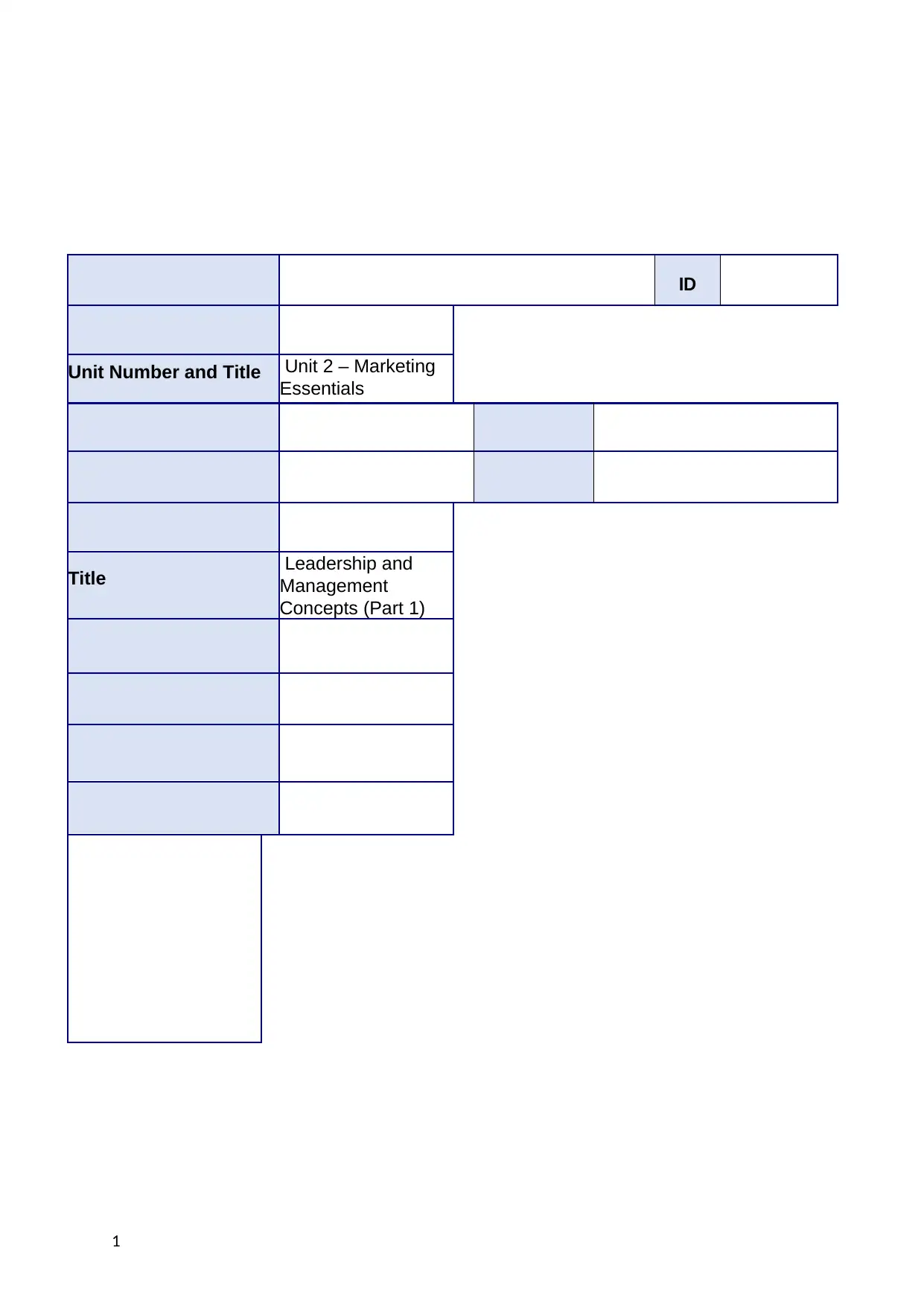
ID
Unit Number and Title Unit 2 – Marketing
Essentials
Title Leadership and
Management
Concepts (Part 1)
1
Unit Number and Title Unit 2 – Marketing
Essentials
Title Leadership and
Management
Concepts (Part 1)
1
Paraphrase This Document
Need a fresh take? Get an instant paraphrase of this document with our AI Paraphraser
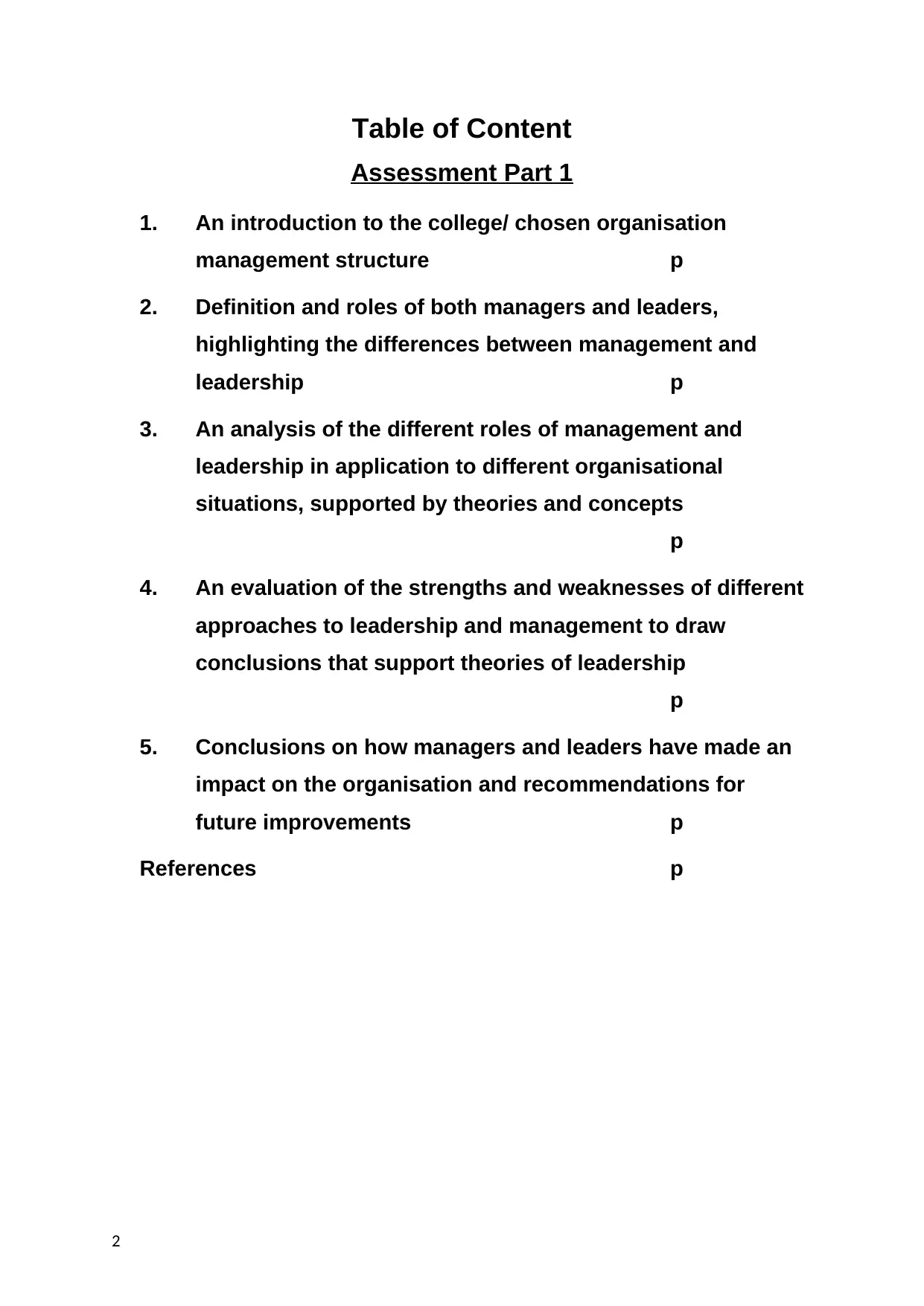
Table of Content
Assessment Part 1
1. An introduction to the college/ chosen organisation
management structure p
2. Definition and roles of both managers and leaders,
highlighting the differences between management and
leadership p
3. An analysis of the different roles of management and
leadership in application to different organisational
situations, supported by theories and concepts
p
4. An evaluation of the strengths and weaknesses of different
approaches to leadership and management to draw
conclusions that support theories of leadership
p
5. Conclusions on how managers and leaders have made an
impact on the organisation and recommendations for
future improvements p
References p
2
Assessment Part 1
1. An introduction to the college/ chosen organisation
management structure p
2. Definition and roles of both managers and leaders,
highlighting the differences between management and
leadership p
3. An analysis of the different roles of management and
leadership in application to different organisational
situations, supported by theories and concepts
p
4. An evaluation of the strengths and weaknesses of different
approaches to leadership and management to draw
conclusions that support theories of leadership
p
5. Conclusions on how managers and leaders have made an
impact on the organisation and recommendations for
future improvements p
References p
2
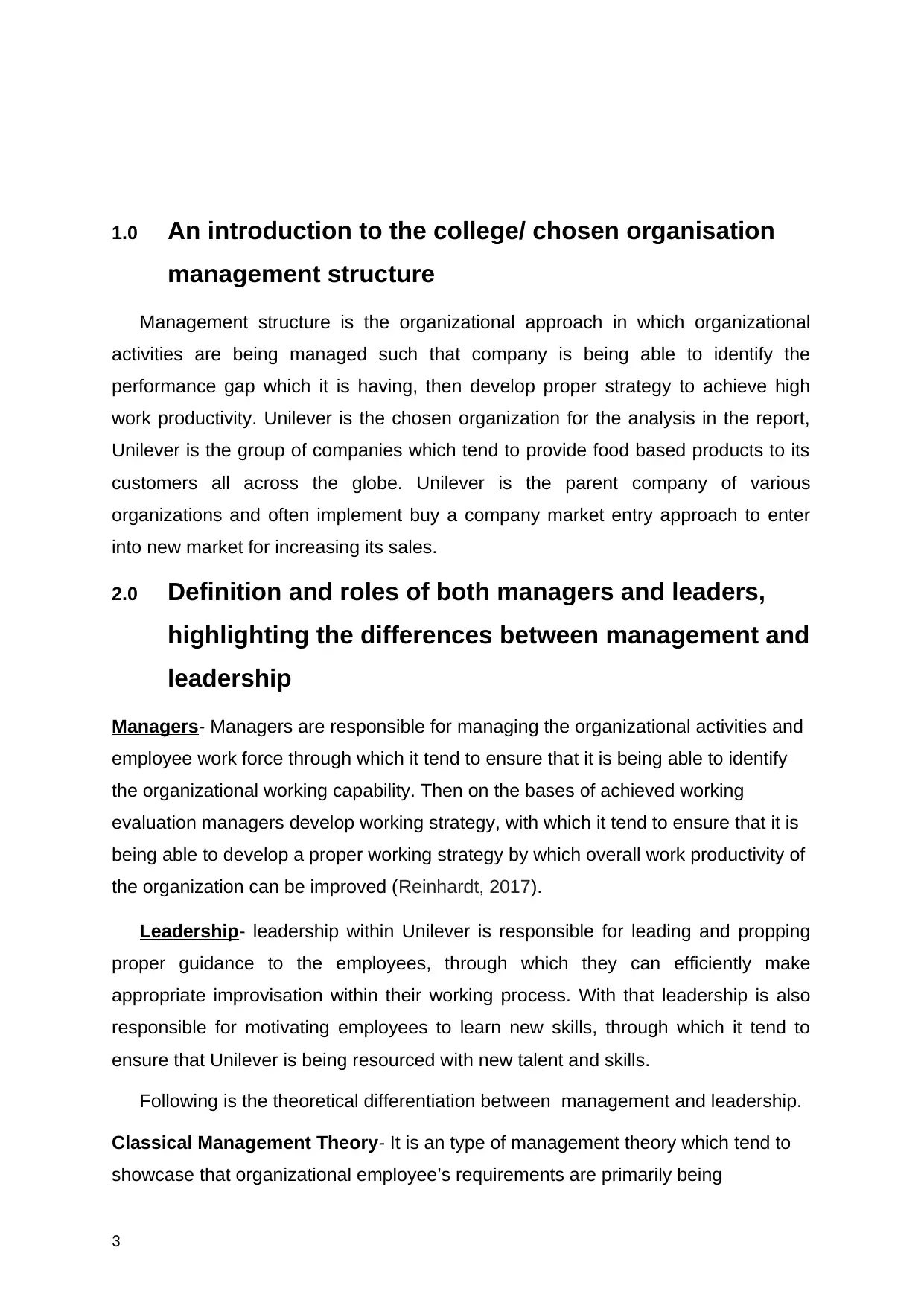
1.0 An introduction to the college/ chosen organisation
management structure
Management structure is the organizational approach in which organizational
activities are being managed such that company is being able to identify the
performance gap which it is having, then develop proper strategy to achieve high
work productivity. Unilever is the chosen organization for the analysis in the report,
Unilever is the group of companies which tend to provide food based products to its
customers all across the globe. Unilever is the parent company of various
organizations and often implement buy a company market entry approach to enter
into new market for increasing its sales.
2.0 Definition and roles of both managers and leaders,
highlighting the differences between management and
leadership
Managers- Managers are responsible for managing the organizational activities and
employee work force through which it tend to ensure that it is being able to identify
the organizational working capability. Then on the bases of achieved working
evaluation managers develop working strategy, with which it tend to ensure that it is
being able to develop a proper working strategy by which overall work productivity of
the organization can be improved (Reinhardt, 2017).
Leadership- leadership within Unilever is responsible for leading and propping
proper guidance to the employees, through which they can efficiently make
appropriate improvisation within their working process. With that leadership is also
responsible for motivating employees to learn new skills, through which it tend to
ensure that Unilever is being resourced with new talent and skills.
Following is the theoretical differentiation between management and leadership.
Classical Management Theory- It is an type of management theory which tend to
showcase that organizational employee’s requirements are primarily being
3
management structure
Management structure is the organizational approach in which organizational
activities are being managed such that company is being able to identify the
performance gap which it is having, then develop proper strategy to achieve high
work productivity. Unilever is the chosen organization for the analysis in the report,
Unilever is the group of companies which tend to provide food based products to its
customers all across the globe. Unilever is the parent company of various
organizations and often implement buy a company market entry approach to enter
into new market for increasing its sales.
2.0 Definition and roles of both managers and leaders,
highlighting the differences between management and
leadership
Managers- Managers are responsible for managing the organizational activities and
employee work force through which it tend to ensure that it is being able to identify
the organizational working capability. Then on the bases of achieved working
evaluation managers develop working strategy, with which it tend to ensure that it is
being able to develop a proper working strategy by which overall work productivity of
the organization can be improved (Reinhardt, 2017).
Leadership- leadership within Unilever is responsible for leading and propping
proper guidance to the employees, through which they can efficiently make
appropriate improvisation within their working process. With that leadership is also
responsible for motivating employees to learn new skills, through which it tend to
ensure that Unilever is being resourced with new talent and skills.
Following is the theoretical differentiation between management and leadership.
Classical Management Theory- It is an type of management theory which tend to
showcase that organizational employee’s requirements are primarily being
3
⊘ This is a preview!⊘
Do you want full access?
Subscribe today to unlock all pages.

Trusted by 1+ million students worldwide
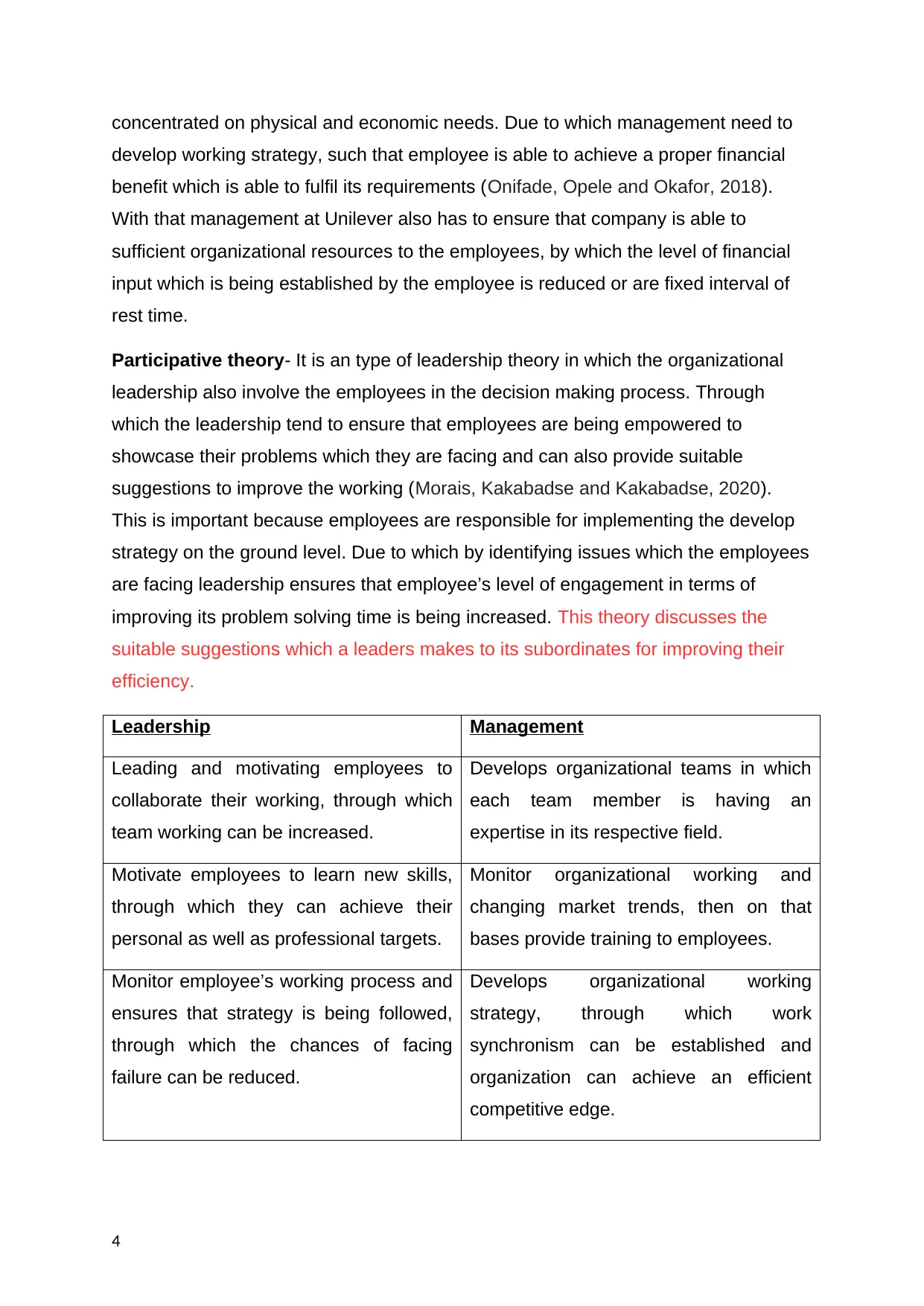
concentrated on physical and economic needs. Due to which management need to
develop working strategy, such that employee is able to achieve a proper financial
benefit which is able to fulfil its requirements (Onifade, Opele and Okafor, 2018).
With that management at Unilever also has to ensure that company is able to
sufficient organizational resources to the employees, by which the level of financial
input which is being established by the employee is reduced or are fixed interval of
rest time.
Participative theory- It is an type of leadership theory in which the organizational
leadership also involve the employees in the decision making process. Through
which the leadership tend to ensure that employees are being empowered to
showcase their problems which they are facing and can also provide suitable
suggestions to improve the working (Morais, Kakabadse and Kakabadse, 2020).
This is important because employees are responsible for implementing the develop
strategy on the ground level. Due to which by identifying issues which the employees
are facing leadership ensures that employee’s level of engagement in terms of
improving its problem solving time is being increased. This theory discusses the
suitable suggestions which a leaders makes to its subordinates for improving their
efficiency.
Leadership Management
Leading and motivating employees to
collaborate their working, through which
team working can be increased.
Develops organizational teams in which
each team member is having an
expertise in its respective field.
Motivate employees to learn new skills,
through which they can achieve their
personal as well as professional targets.
Monitor organizational working and
changing market trends, then on that
bases provide training to employees.
Monitor employee’s working process and
ensures that strategy is being followed,
through which the chances of facing
failure can be reduced.
Develops organizational working
strategy, through which work
synchronism can be established and
organization can achieve an efficient
competitive edge.
4
develop working strategy, such that employee is able to achieve a proper financial
benefit which is able to fulfil its requirements (Onifade, Opele and Okafor, 2018).
With that management at Unilever also has to ensure that company is able to
sufficient organizational resources to the employees, by which the level of financial
input which is being established by the employee is reduced or are fixed interval of
rest time.
Participative theory- It is an type of leadership theory in which the organizational
leadership also involve the employees in the decision making process. Through
which the leadership tend to ensure that employees are being empowered to
showcase their problems which they are facing and can also provide suitable
suggestions to improve the working (Morais, Kakabadse and Kakabadse, 2020).
This is important because employees are responsible for implementing the develop
strategy on the ground level. Due to which by identifying issues which the employees
are facing leadership ensures that employee’s level of engagement in terms of
improving its problem solving time is being increased. This theory discusses the
suitable suggestions which a leaders makes to its subordinates for improving their
efficiency.
Leadership Management
Leading and motivating employees to
collaborate their working, through which
team working can be increased.
Develops organizational teams in which
each team member is having an
expertise in its respective field.
Motivate employees to learn new skills,
through which they can achieve their
personal as well as professional targets.
Monitor organizational working and
changing market trends, then on that
bases provide training to employees.
Monitor employee’s working process and
ensures that strategy is being followed,
through which the chances of facing
failure can be reduced.
Develops organizational working
strategy, through which work
synchronism can be established and
organization can achieve an efficient
competitive edge.
4
Paraphrase This Document
Need a fresh take? Get an instant paraphrase of this document with our AI Paraphraser
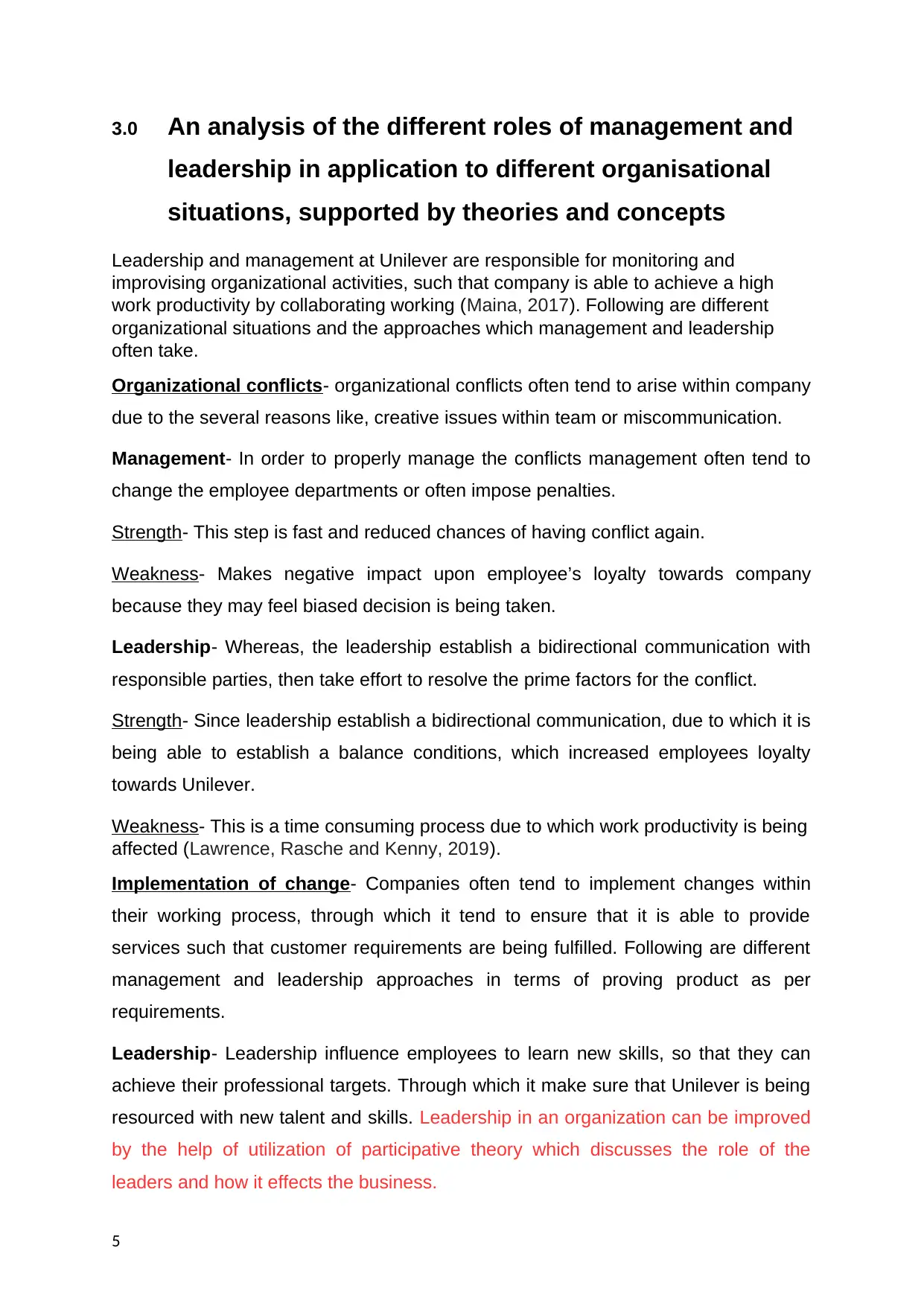
3.0 An analysis of the different roles of management and
leadership in application to different organisational
situations, supported by theories and concepts
Leadership and management at Unilever are responsible for monitoring and
improvising organizational activities, such that company is able to achieve a high
work productivity by collaborating working (Maina, 2017). Following are different
organizational situations and the approaches which management and leadership
often take.
Organizational conflicts- organizational conflicts often tend to arise within company
due to the several reasons like, creative issues within team or miscommunication.
Management- In order to properly manage the conflicts management often tend to
change the employee departments or often impose penalties.
Strength- This step is fast and reduced chances of having conflict again.
Weakness- Makes negative impact upon employee’s loyalty towards company
because they may feel biased decision is being taken.
Leadership- Whereas, the leadership establish a bidirectional communication with
responsible parties, then take effort to resolve the prime factors for the conflict.
Strength- Since leadership establish a bidirectional communication, due to which it is
being able to establish a balance conditions, which increased employees loyalty
towards Unilever.
Weakness- This is a time consuming process due to which work productivity is being
affected (Lawrence, Rasche and Kenny, 2019).
Implementation of change- Companies often tend to implement changes within
their working process, through which it tend to ensure that it is able to provide
services such that customer requirements are being fulfilled. Following are different
management and leadership approaches in terms of proving product as per
requirements.
Leadership- Leadership influence employees to learn new skills, so that they can
achieve their professional targets. Through which it make sure that Unilever is being
resourced with new talent and skills. Leadership in an organization can be improved
by the help of utilization of participative theory which discusses the role of the
leaders and how it effects the business.
5
leadership in application to different organisational
situations, supported by theories and concepts
Leadership and management at Unilever are responsible for monitoring and
improvising organizational activities, such that company is able to achieve a high
work productivity by collaborating working (Maina, 2017). Following are different
organizational situations and the approaches which management and leadership
often take.
Organizational conflicts- organizational conflicts often tend to arise within company
due to the several reasons like, creative issues within team or miscommunication.
Management- In order to properly manage the conflicts management often tend to
change the employee departments or often impose penalties.
Strength- This step is fast and reduced chances of having conflict again.
Weakness- Makes negative impact upon employee’s loyalty towards company
because they may feel biased decision is being taken.
Leadership- Whereas, the leadership establish a bidirectional communication with
responsible parties, then take effort to resolve the prime factors for the conflict.
Strength- Since leadership establish a bidirectional communication, due to which it is
being able to establish a balance conditions, which increased employees loyalty
towards Unilever.
Weakness- This is a time consuming process due to which work productivity is being
affected (Lawrence, Rasche and Kenny, 2019).
Implementation of change- Companies often tend to implement changes within
their working process, through which it tend to ensure that it is able to provide
services such that customer requirements are being fulfilled. Following are different
management and leadership approaches in terms of proving product as per
requirements.
Leadership- Leadership influence employees to learn new skills, so that they can
achieve their professional targets. Through which it make sure that Unilever is being
resourced with new talent and skills. Leadership in an organization can be improved
by the help of utilization of participative theory which discusses the role of the
leaders and how it effects the business.
5
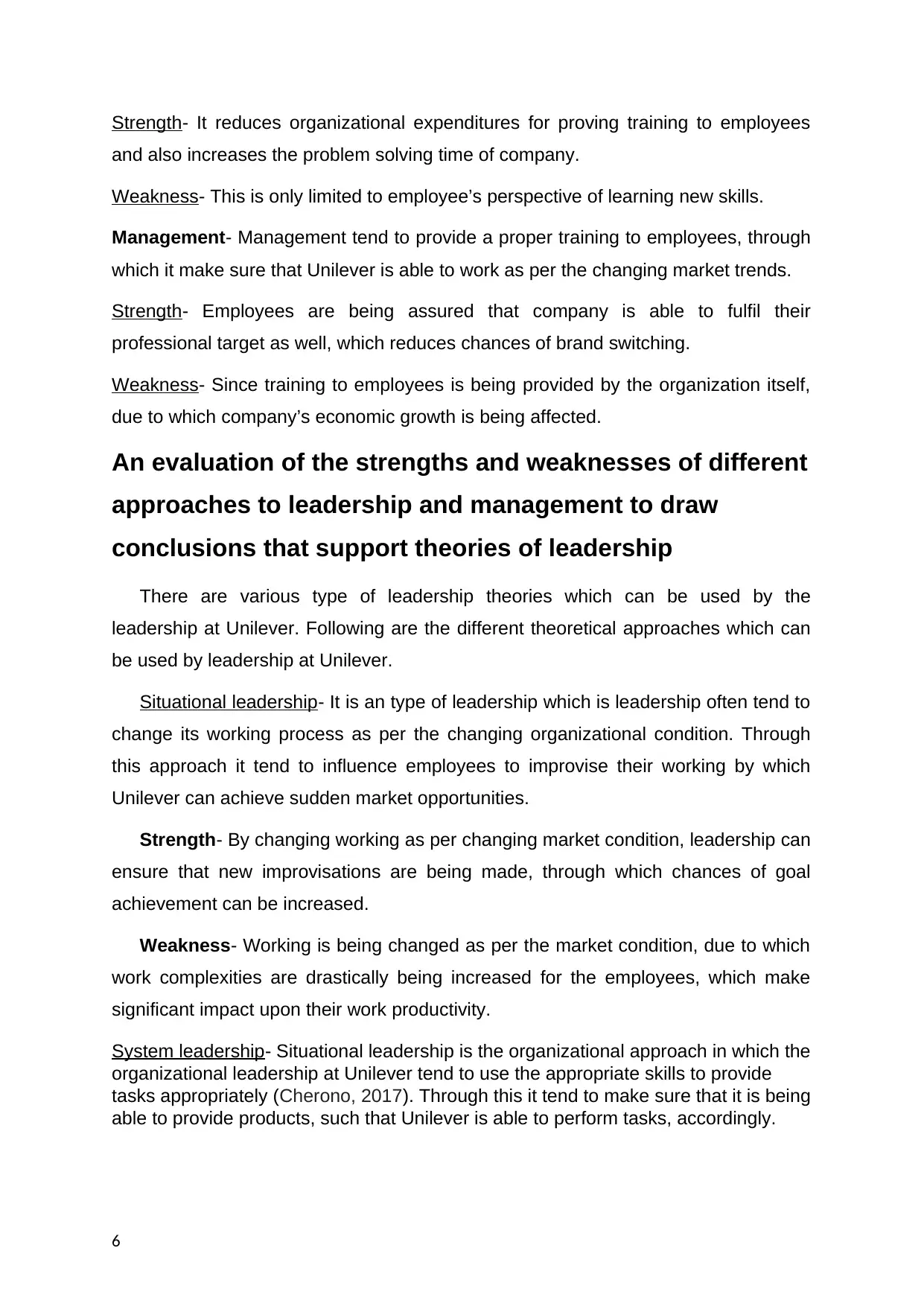
Strength- It reduces organizational expenditures for proving training to employees
and also increases the problem solving time of company.
Weakness- This is only limited to employee’s perspective of learning new skills.
Management- Management tend to provide a proper training to employees, through
which it make sure that Unilever is able to work as per the changing market trends.
Strength- Employees are being assured that company is able to fulfil their
professional target as well, which reduces chances of brand switching.
Weakness- Since training to employees is being provided by the organization itself,
due to which company’s economic growth is being affected.
An evaluation of the strengths and weaknesses of different
approaches to leadership and management to draw
conclusions that support theories of leadership
There are various type of leadership theories which can be used by the
leadership at Unilever. Following are the different theoretical approaches which can
be used by leadership at Unilever.
Situational leadership- It is an type of leadership which is leadership often tend to
change its working process as per the changing organizational condition. Through
this approach it tend to influence employees to improvise their working by which
Unilever can achieve sudden market opportunities.
Strength- By changing working as per changing market condition, leadership can
ensure that new improvisations are being made, through which chances of goal
achievement can be increased.
Weakness- Working is being changed as per the market condition, due to which
work complexities are drastically being increased for the employees, which make
significant impact upon their work productivity.
System leadership- Situational leadership is the organizational approach in which the
organizational leadership at Unilever tend to use the appropriate skills to provide
tasks appropriately (Cherono, 2017). Through this it tend to make sure that it is being
able to provide products, such that Unilever is able to perform tasks, accordingly.
6
and also increases the problem solving time of company.
Weakness- This is only limited to employee’s perspective of learning new skills.
Management- Management tend to provide a proper training to employees, through
which it make sure that Unilever is able to work as per the changing market trends.
Strength- Employees are being assured that company is able to fulfil their
professional target as well, which reduces chances of brand switching.
Weakness- Since training to employees is being provided by the organization itself,
due to which company’s economic growth is being affected.
An evaluation of the strengths and weaknesses of different
approaches to leadership and management to draw
conclusions that support theories of leadership
There are various type of leadership theories which can be used by the
leadership at Unilever. Following are the different theoretical approaches which can
be used by leadership at Unilever.
Situational leadership- It is an type of leadership which is leadership often tend to
change its working process as per the changing organizational condition. Through
this approach it tend to influence employees to improvise their working by which
Unilever can achieve sudden market opportunities.
Strength- By changing working as per changing market condition, leadership can
ensure that new improvisations are being made, through which chances of goal
achievement can be increased.
Weakness- Working is being changed as per the market condition, due to which
work complexities are drastically being increased for the employees, which make
significant impact upon their work productivity.
System leadership- Situational leadership is the organizational approach in which the
organizational leadership at Unilever tend to use the appropriate skills to provide
tasks appropriately (Cherono, 2017). Through this it tend to make sure that it is being
able to provide products, such that Unilever is able to perform tasks, accordingly.
6
⊘ This is a preview!⊘
Do you want full access?
Subscribe today to unlock all pages.

Trusted by 1+ million students worldwide
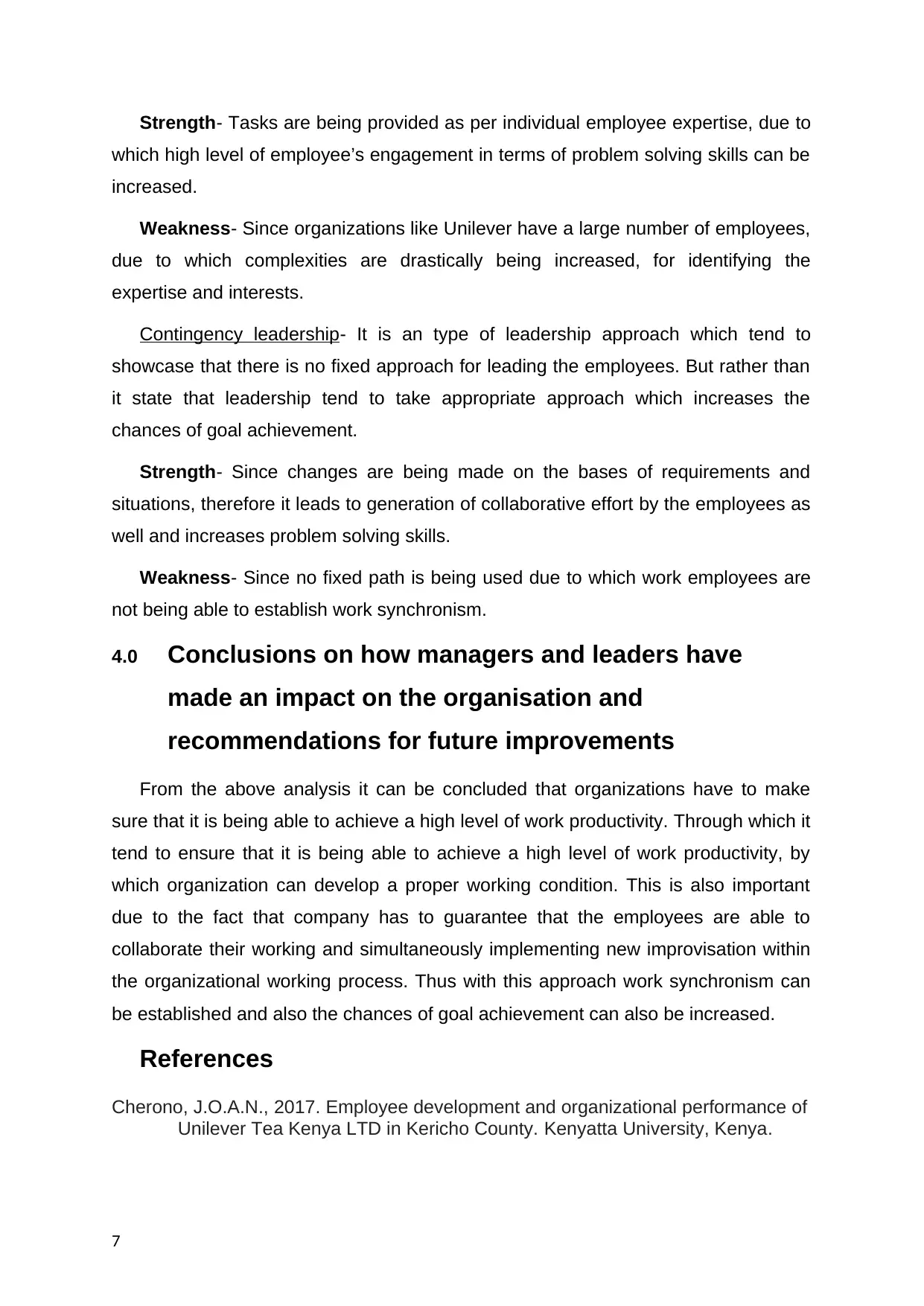
Strength- Tasks are being provided as per individual employee expertise, due to
which high level of employee’s engagement in terms of problem solving skills can be
increased.
Weakness- Since organizations like Unilever have a large number of employees,
due to which complexities are drastically being increased, for identifying the
expertise and interests.
Contingency leadership- It is an type of leadership approach which tend to
showcase that there is no fixed approach for leading the employees. But rather than
it state that leadership tend to take appropriate approach which increases the
chances of goal achievement.
Strength- Since changes are being made on the bases of requirements and
situations, therefore it leads to generation of collaborative effort by the employees as
well and increases problem solving skills.
Weakness- Since no fixed path is being used due to which work employees are
not being able to establish work synchronism.
4.0 Conclusions on how managers and leaders have
made an impact on the organisation and
recommendations for future improvements
From the above analysis it can be concluded that organizations have to make
sure that it is being able to achieve a high level of work productivity. Through which it
tend to ensure that it is being able to achieve a high level of work productivity, by
which organization can develop a proper working condition. This is also important
due to the fact that company has to guarantee that the employees are able to
collaborate their working and simultaneously implementing new improvisation within
the organizational working process. Thus with this approach work synchronism can
be established and also the chances of goal achievement can also be increased.
References
Cherono, J.O.A.N., 2017. Employee development and organizational performance of
Unilever Tea Kenya LTD in Kericho County. Kenyatta University, Kenya.
7
which high level of employee’s engagement in terms of problem solving skills can be
increased.
Weakness- Since organizations like Unilever have a large number of employees,
due to which complexities are drastically being increased, for identifying the
expertise and interests.
Contingency leadership- It is an type of leadership approach which tend to
showcase that there is no fixed approach for leading the employees. But rather than
it state that leadership tend to take appropriate approach which increases the
chances of goal achievement.
Strength- Since changes are being made on the bases of requirements and
situations, therefore it leads to generation of collaborative effort by the employees as
well and increases problem solving skills.
Weakness- Since no fixed path is being used due to which work employees are
not being able to establish work synchronism.
4.0 Conclusions on how managers and leaders have
made an impact on the organisation and
recommendations for future improvements
From the above analysis it can be concluded that organizations have to make
sure that it is being able to achieve a high level of work productivity. Through which it
tend to ensure that it is being able to achieve a high level of work productivity, by
which organization can develop a proper working condition. This is also important
due to the fact that company has to guarantee that the employees are able to
collaborate their working and simultaneously implementing new improvisation within
the organizational working process. Thus with this approach work synchronism can
be established and also the chances of goal achievement can also be increased.
References
Cherono, J.O.A.N., 2017. Employee development and organizational performance of
Unilever Tea Kenya LTD in Kericho County. Kenyatta University, Kenya.
7
Paraphrase This Document
Need a fresh take? Get an instant paraphrase of this document with our AI Paraphraser
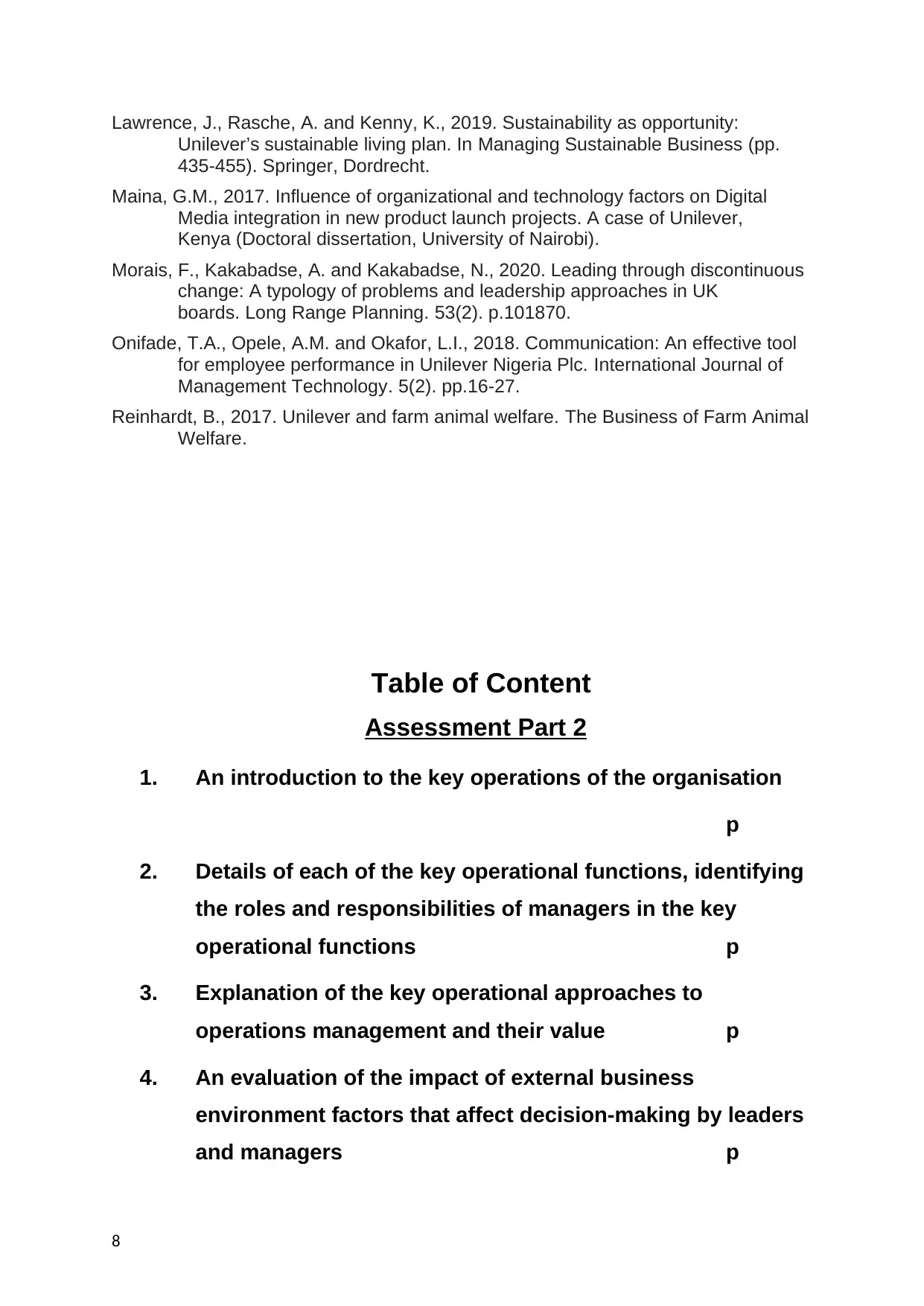
Lawrence, J., Rasche, A. and Kenny, K., 2019. Sustainability as opportunity:
Unilever’s sustainable living plan. In Managing Sustainable Business (pp.
435-455). Springer, Dordrecht.
Maina, G.M., 2017. Influence of organizational and technology factors on Digital
Media integration in new product launch projects. A case of Unilever,
Kenya (Doctoral dissertation, University of Nairobi).
Morais, F., Kakabadse, A. and Kakabadse, N., 2020. Leading through discontinuous
change: A typology of problems and leadership approaches in UK
boards. Long Range Planning. 53(2). p.101870.
Onifade, T.A., Opele, A.M. and Okafor, L.I., 2018. Communication: An effective tool
for employee performance in Unilever Nigeria Plc. International Journal of
Management Technology. 5(2). pp.16-27.
Reinhardt, B., 2017. Unilever and farm animal welfare. The Business of Farm Animal
Welfare.
Table of Content
Assessment Part 2
1. An introduction to the key operations of the organisation
p
2. Details of each of the key operational functions, identifying
the roles and responsibilities of managers in the key
operational functions p
3. Explanation of the key operational approaches to
operations management and their value p
4. An evaluation of the impact of external business
environment factors that affect decision-making by leaders
and managers p
8
Unilever’s sustainable living plan. In Managing Sustainable Business (pp.
435-455). Springer, Dordrecht.
Maina, G.M., 2017. Influence of organizational and technology factors on Digital
Media integration in new product launch projects. A case of Unilever,
Kenya (Doctoral dissertation, University of Nairobi).
Morais, F., Kakabadse, A. and Kakabadse, N., 2020. Leading through discontinuous
change: A typology of problems and leadership approaches in UK
boards. Long Range Planning. 53(2). p.101870.
Onifade, T.A., Opele, A.M. and Okafor, L.I., 2018. Communication: An effective tool
for employee performance in Unilever Nigeria Plc. International Journal of
Management Technology. 5(2). pp.16-27.
Reinhardt, B., 2017. Unilever and farm animal welfare. The Business of Farm Animal
Welfare.
Table of Content
Assessment Part 2
1. An introduction to the key operations of the organisation
p
2. Details of each of the key operational functions, identifying
the roles and responsibilities of managers in the key
operational functions p
3. Explanation of the key operational approaches to
operations management and their value p
4. An evaluation of the impact of external business
environment factors that affect decision-making by leaders
and managers p
8
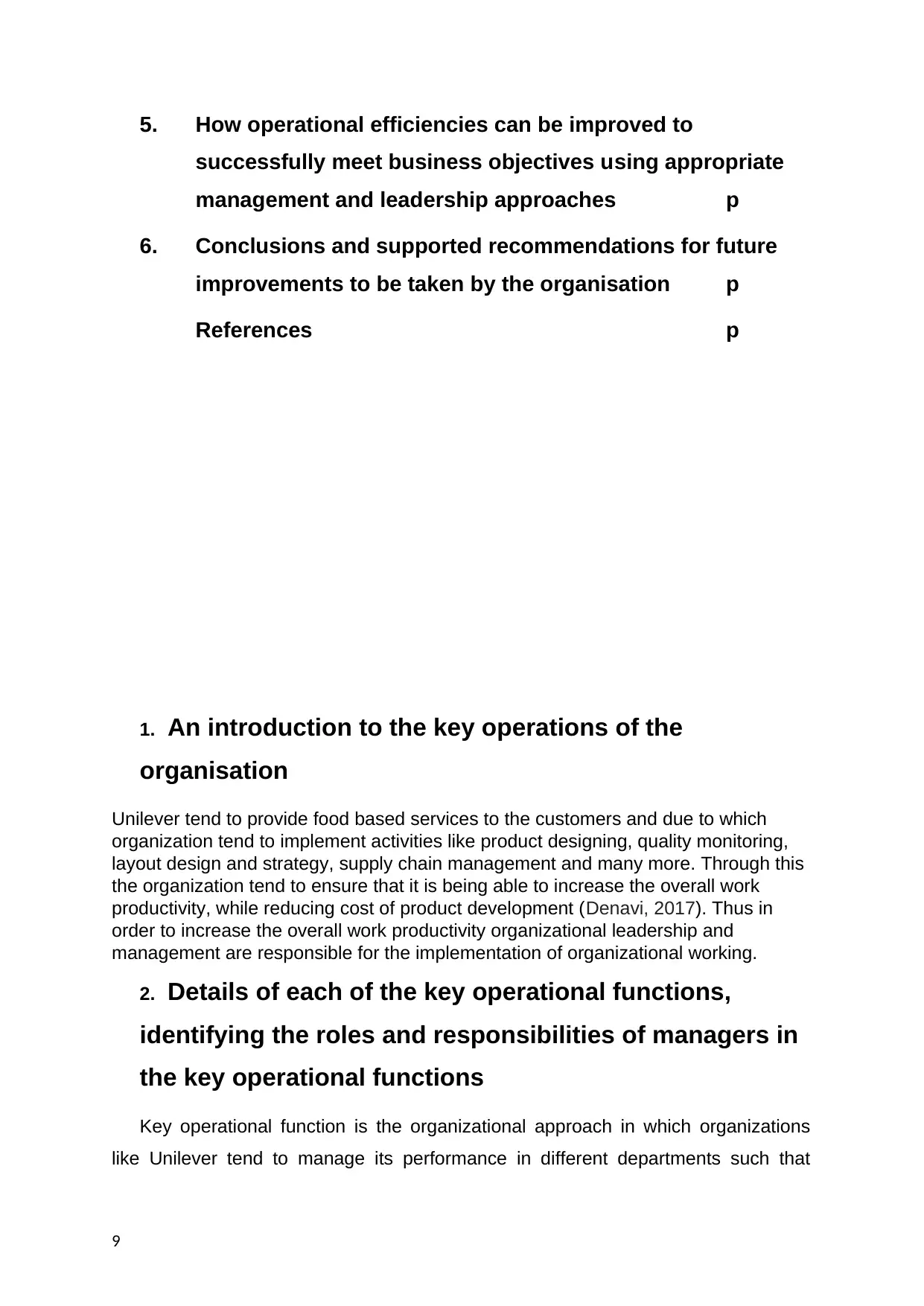
5. How operational efficiencies can be improved to
successfully meet business objectives using appropriate
management and leadership approaches p
6. Conclusions and supported recommendations for future
improvements to be taken by the organisation p
References p
1. An introduction to the key operations of the
organisation
Unilever tend to provide food based services to the customers and due to which
organization tend to implement activities like product designing, quality monitoring,
layout design and strategy, supply chain management and many more. Through this
the organization tend to ensure that it is being able to increase the overall work
productivity, while reducing cost of product development (Denavi, 2017). Thus in
order to increase the overall work productivity organizational leadership and
management are responsible for the implementation of organizational working.
2. Details of each of the key operational functions,
identifying the roles and responsibilities of managers in
the key operational functions
Key operational function is the organizational approach in which organizations
like Unilever tend to manage its performance in different departments such that
9
successfully meet business objectives using appropriate
management and leadership approaches p
6. Conclusions and supported recommendations for future
improvements to be taken by the organisation p
References p
1. An introduction to the key operations of the
organisation
Unilever tend to provide food based services to the customers and due to which
organization tend to implement activities like product designing, quality monitoring,
layout design and strategy, supply chain management and many more. Through this
the organization tend to ensure that it is being able to increase the overall work
productivity, while reducing cost of product development (Denavi, 2017). Thus in
order to increase the overall work productivity organizational leadership and
management are responsible for the implementation of organizational working.
2. Details of each of the key operational functions,
identifying the roles and responsibilities of managers in
the key operational functions
Key operational function is the organizational approach in which organizations
like Unilever tend to manage its performance in different departments such that
9
⊘ This is a preview!⊘
Do you want full access?
Subscribe today to unlock all pages.

Trusted by 1+ million students worldwide
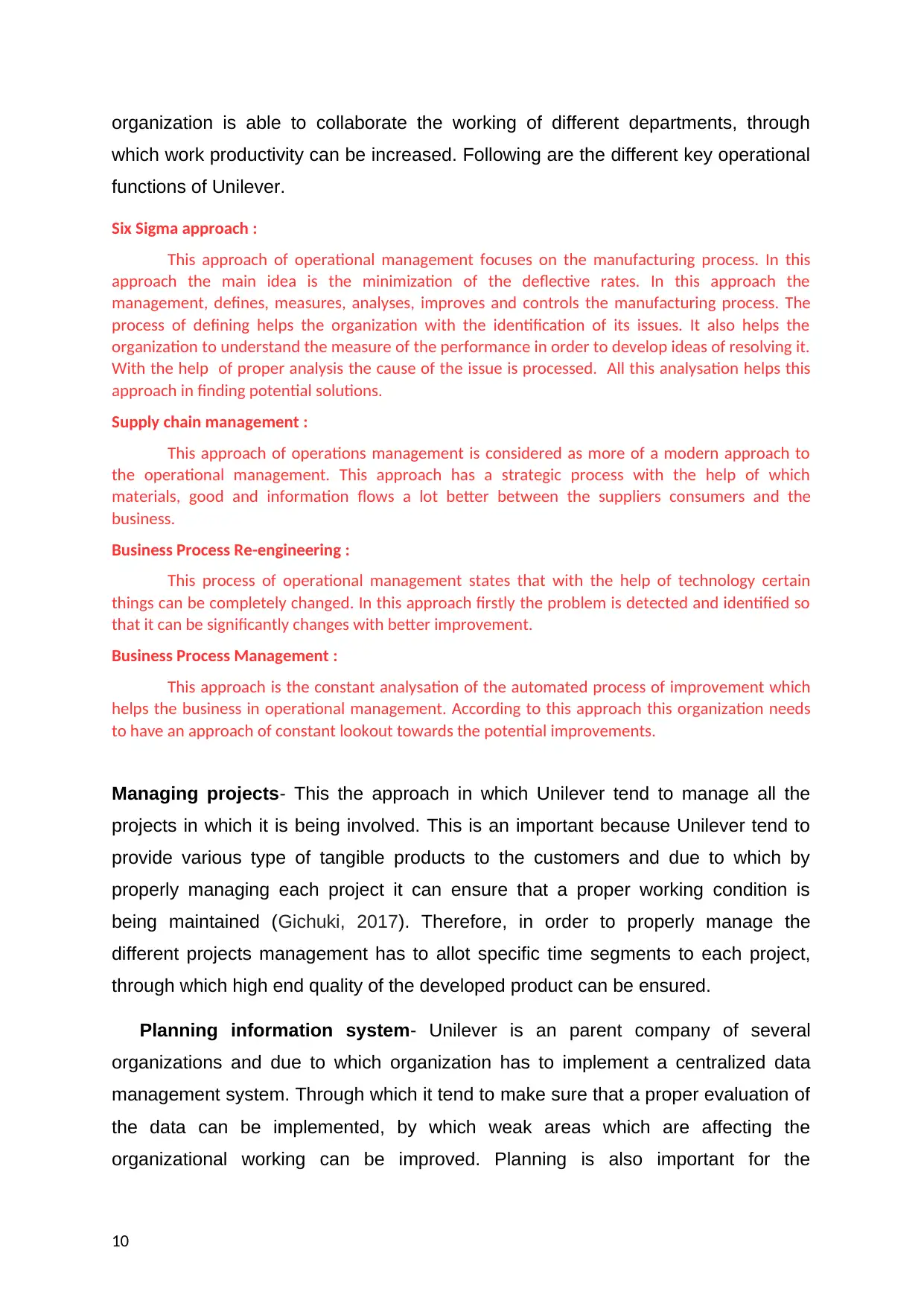
organization is able to collaborate the working of different departments, through
which work productivity can be increased. Following are the different key operational
functions of Unilever.
Six Sigma approach :
This approach of operational management focuses on the manufacturing process. In this
approach the main idea is the minimization of the deflective rates. In this approach the
management, defines, measures, analyses, improves and controls the manufacturing process. The
process of defining helps the organization with the identification of its issues. It also helps the
organization to understand the measure of the performance in order to develop ideas of resolving it.
With the help of proper analysis the cause of the issue is processed. All this analysation helps this
approach in finding potential solutions.
Supply chain management :
This approach of operations management is considered as more of a modern approach to
the operational management. This approach has a strategic process with the help of which
materials, good and information flows a lot better between the suppliers consumers and the
business.
Business Process Re-engineering :
This process of operational management states that with the help of technology certain
things can be completely changed. In this approach firstly the problem is detected and identified so
that it can be significantly changes with better improvement.
Business Process Management :
This approach is the constant analysation of the automated process of improvement which
helps the business in operational management. According to this approach this organization needs
to have an approach of constant lookout towards the potential improvements.
Managing projects- This the approach in which Unilever tend to manage all the
projects in which it is being involved. This is an important because Unilever tend to
provide various type of tangible products to the customers and due to which by
properly managing each project it can ensure that a proper working condition is
being maintained (Gichuki, 2017). Therefore, in order to properly manage the
different projects management has to allot specific time segments to each project,
through which high end quality of the developed product can be ensured.
Planning information system- Unilever is an parent company of several
organizations and due to which organization has to implement a centralized data
management system. Through which it tend to make sure that a proper evaluation of
the data can be implemented, by which weak areas which are affecting the
organizational working can be improved. Planning is also important for the
10
which work productivity can be increased. Following are the different key operational
functions of Unilever.
Six Sigma approach :
This approach of operational management focuses on the manufacturing process. In this
approach the main idea is the minimization of the deflective rates. In this approach the
management, defines, measures, analyses, improves and controls the manufacturing process. The
process of defining helps the organization with the identification of its issues. It also helps the
organization to understand the measure of the performance in order to develop ideas of resolving it.
With the help of proper analysis the cause of the issue is processed. All this analysation helps this
approach in finding potential solutions.
Supply chain management :
This approach of operations management is considered as more of a modern approach to
the operational management. This approach has a strategic process with the help of which
materials, good and information flows a lot better between the suppliers consumers and the
business.
Business Process Re-engineering :
This process of operational management states that with the help of technology certain
things can be completely changed. In this approach firstly the problem is detected and identified so
that it can be significantly changes with better improvement.
Business Process Management :
This approach is the constant analysation of the automated process of improvement which
helps the business in operational management. According to this approach this organization needs
to have an approach of constant lookout towards the potential improvements.
Managing projects- This the approach in which Unilever tend to manage all the
projects in which it is being involved. This is an important because Unilever tend to
provide various type of tangible products to the customers and due to which by
properly managing each project it can ensure that a proper working condition is
being maintained (Gichuki, 2017). Therefore, in order to properly manage the
different projects management has to allot specific time segments to each project,
through which high end quality of the developed product can be ensured.
Planning information system- Unilever is an parent company of several
organizations and due to which organization has to implement a centralized data
management system. Through which it tend to make sure that a proper evaluation of
the data can be implemented, by which weak areas which are affecting the
organizational working can be improved. Planning is also important for the
10
Paraphrase This Document
Need a fresh take? Get an instant paraphrase of this document with our AI Paraphraser
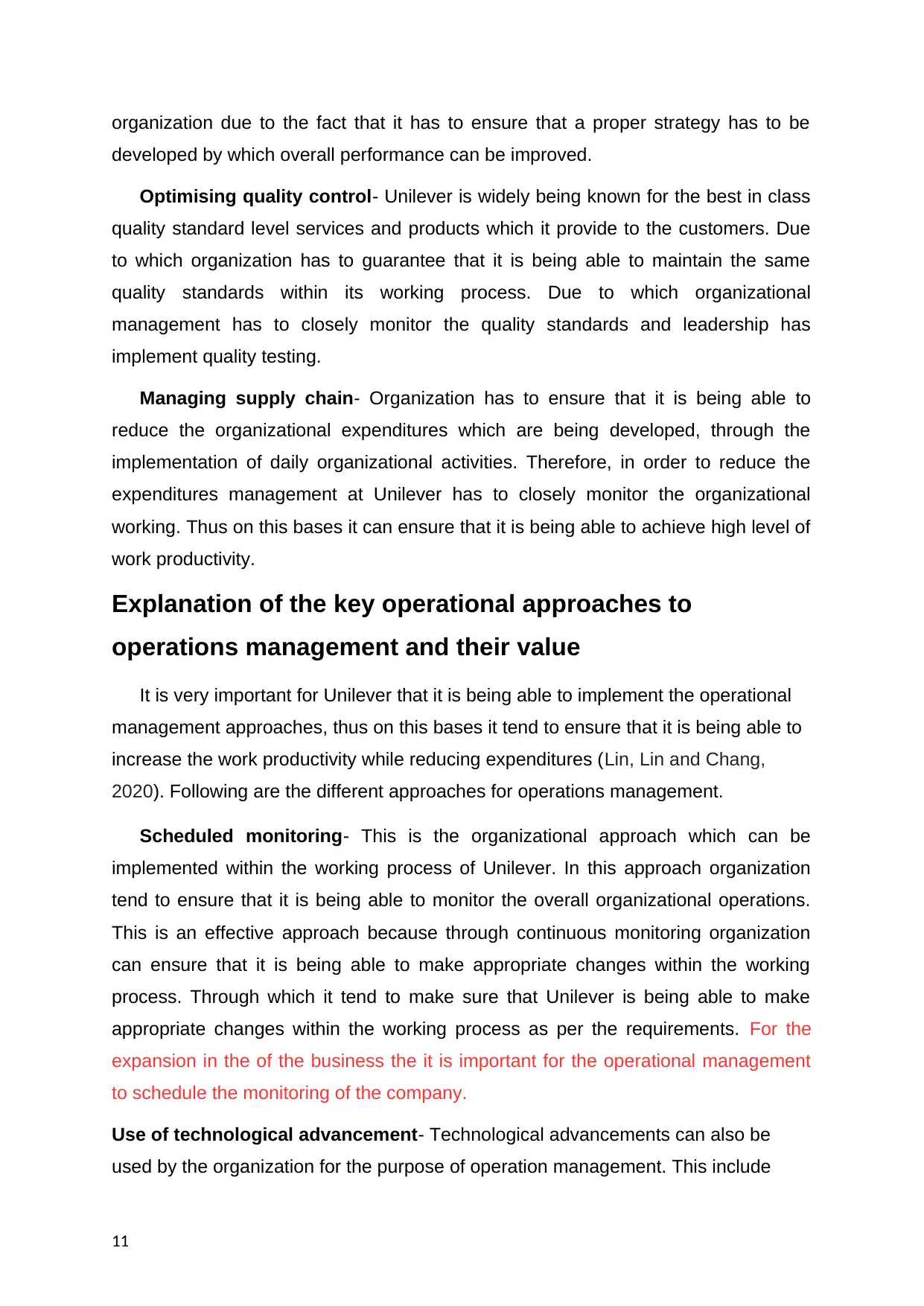
organization due to the fact that it has to ensure that a proper strategy has to be
developed by which overall performance can be improved.
Optimising quality control- Unilever is widely being known for the best in class
quality standard level services and products which it provide to the customers. Due
to which organization has to guarantee that it is being able to maintain the same
quality standards within its working process. Due to which organizational
management has to closely monitor the quality standards and leadership has
implement quality testing.
Managing supply chain- Organization has to ensure that it is being able to
reduce the organizational expenditures which are being developed, through the
implementation of daily organizational activities. Therefore, in order to reduce the
expenditures management at Unilever has to closely monitor the organizational
working. Thus on this bases it can ensure that it is being able to achieve high level of
work productivity.
Explanation of the key operational approaches to
operations management and their value
It is very important for Unilever that it is being able to implement the operational
management approaches, thus on this bases it tend to ensure that it is being able to
increase the work productivity while reducing expenditures (Lin, Lin and Chang,
2020). Following are the different approaches for operations management.
Scheduled monitoring- This is the organizational approach which can be
implemented within the working process of Unilever. In this approach organization
tend to ensure that it is being able to monitor the overall organizational operations.
This is an effective approach because through continuous monitoring organization
can ensure that it is being able to make appropriate changes within the working
process. Through which it tend to make sure that Unilever is being able to make
appropriate changes within the working process as per the requirements. For the
expansion in the of the business the it is important for the operational management
to schedule the monitoring of the company.
Use of technological advancement- Technological advancements can also be
used by the organization for the purpose of operation management. This include
11
developed by which overall performance can be improved.
Optimising quality control- Unilever is widely being known for the best in class
quality standard level services and products which it provide to the customers. Due
to which organization has to guarantee that it is being able to maintain the same
quality standards within its working process. Due to which organizational
management has to closely monitor the quality standards and leadership has
implement quality testing.
Managing supply chain- Organization has to ensure that it is being able to
reduce the organizational expenditures which are being developed, through the
implementation of daily organizational activities. Therefore, in order to reduce the
expenditures management at Unilever has to closely monitor the organizational
working. Thus on this bases it can ensure that it is being able to achieve high level of
work productivity.
Explanation of the key operational approaches to
operations management and their value
It is very important for Unilever that it is being able to implement the operational
management approaches, thus on this bases it tend to ensure that it is being able to
increase the work productivity while reducing expenditures (Lin, Lin and Chang,
2020). Following are the different approaches for operations management.
Scheduled monitoring- This is the organizational approach which can be
implemented within the working process of Unilever. In this approach organization
tend to ensure that it is being able to monitor the overall organizational operations.
This is an effective approach because through continuous monitoring organization
can ensure that it is being able to make appropriate changes within the working
process. Through which it tend to make sure that Unilever is being able to make
appropriate changes within the working process as per the requirements. For the
expansion in the of the business the it is important for the operational management
to schedule the monitoring of the company.
Use of technological advancement- Technological advancements can also be
used by the organization for the purpose of operation management. This include
11
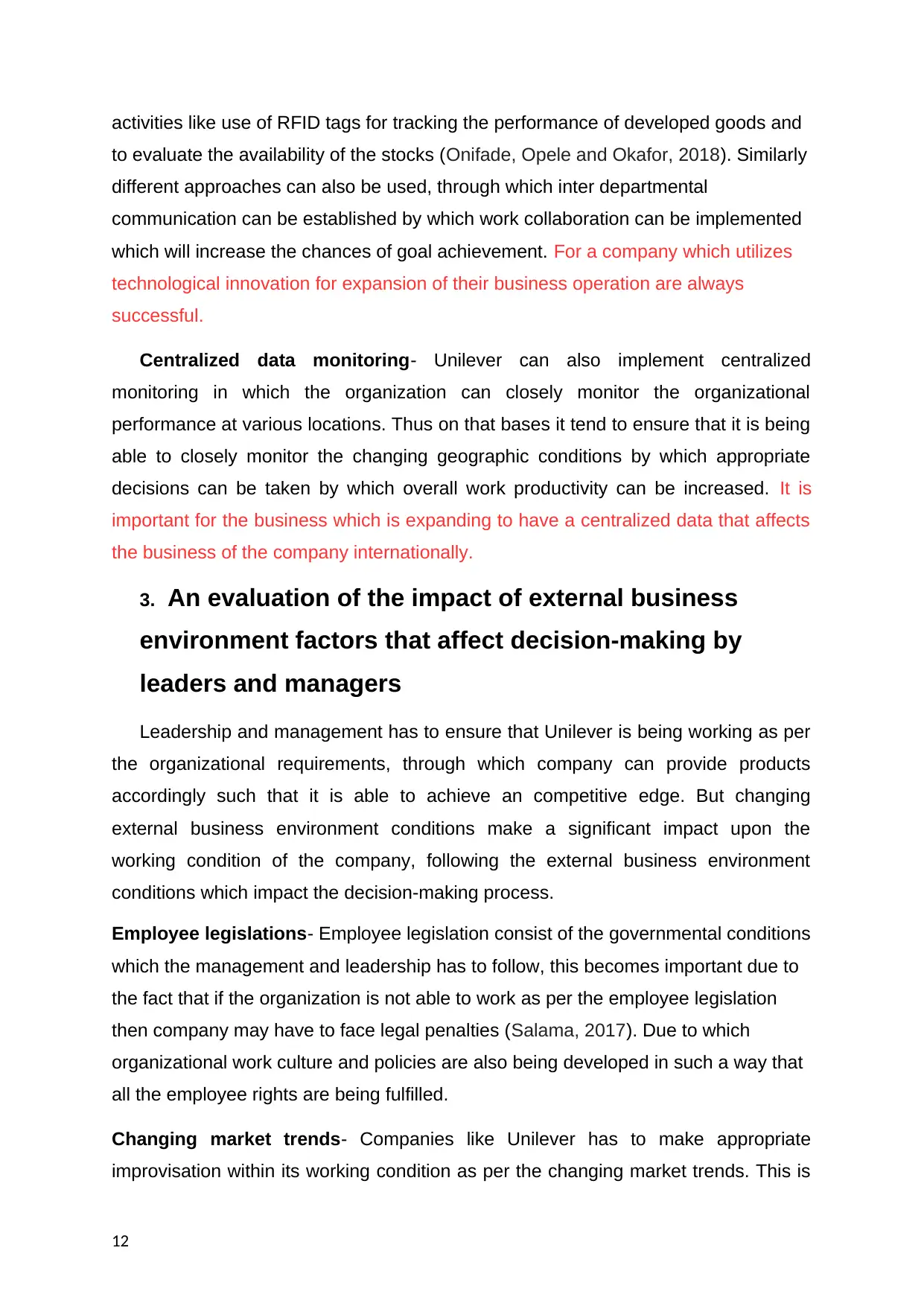
activities like use of RFID tags for tracking the performance of developed goods and
to evaluate the availability of the stocks (Onifade, Opele and Okafor, 2018). Similarly
different approaches can also be used, through which inter departmental
communication can be established by which work collaboration can be implemented
which will increase the chances of goal achievement. For a company which utilizes
technological innovation for expansion of their business operation are always
successful.
Centralized data monitoring- Unilever can also implement centralized
monitoring in which the organization can closely monitor the organizational
performance at various locations. Thus on that bases it tend to ensure that it is being
able to closely monitor the changing geographic conditions by which appropriate
decisions can be taken by which overall work productivity can be increased. It is
important for the business which is expanding to have a centralized data that affects
the business of the company internationally.
3. An evaluation of the impact of external business
environment factors that affect decision-making by
leaders and managers
Leadership and management has to ensure that Unilever is being working as per
the organizational requirements, through which company can provide products
accordingly such that it is able to achieve an competitive edge. But changing
external business environment conditions make a significant impact upon the
working condition of the company, following the external business environment
conditions which impact the decision-making process.
Employee legislations- Employee legislation consist of the governmental conditions
which the management and leadership has to follow, this becomes important due to
the fact that if the organization is not able to work as per the employee legislation
then company may have to face legal penalties (Salama, 2017). Due to which
organizational work culture and policies are also being developed in such a way that
all the employee rights are being fulfilled.
Changing market trends- Companies like Unilever has to make appropriate
improvisation within its working condition as per the changing market trends. This is
12
to evaluate the availability of the stocks (Onifade, Opele and Okafor, 2018). Similarly
different approaches can also be used, through which inter departmental
communication can be established by which work collaboration can be implemented
which will increase the chances of goal achievement. For a company which utilizes
technological innovation for expansion of their business operation are always
successful.
Centralized data monitoring- Unilever can also implement centralized
monitoring in which the organization can closely monitor the organizational
performance at various locations. Thus on that bases it tend to ensure that it is being
able to closely monitor the changing geographic conditions by which appropriate
decisions can be taken by which overall work productivity can be increased. It is
important for the business which is expanding to have a centralized data that affects
the business of the company internationally.
3. An evaluation of the impact of external business
environment factors that affect decision-making by
leaders and managers
Leadership and management has to ensure that Unilever is being working as per
the organizational requirements, through which company can provide products
accordingly such that it is able to achieve an competitive edge. But changing
external business environment conditions make a significant impact upon the
working condition of the company, following the external business environment
conditions which impact the decision-making process.
Employee legislations- Employee legislation consist of the governmental conditions
which the management and leadership has to follow, this becomes important due to
the fact that if the organization is not able to work as per the employee legislation
then company may have to face legal penalties (Salama, 2017). Due to which
organizational work culture and policies are also being developed in such a way that
all the employee rights are being fulfilled.
Changing market trends- Companies like Unilever has to make appropriate
improvisation within its working condition as per the changing market trends. This is
12
⊘ This is a preview!⊘
Do you want full access?
Subscribe today to unlock all pages.

Trusted by 1+ million students worldwide
1 out of 15
Related Documents
Your All-in-One AI-Powered Toolkit for Academic Success.
+13062052269
info@desklib.com
Available 24*7 on WhatsApp / Email
![[object Object]](/_next/static/media/star-bottom.7253800d.svg)
Unlock your academic potential
Copyright © 2020–2026 A2Z Services. All Rights Reserved. Developed and managed by ZUCOL.




